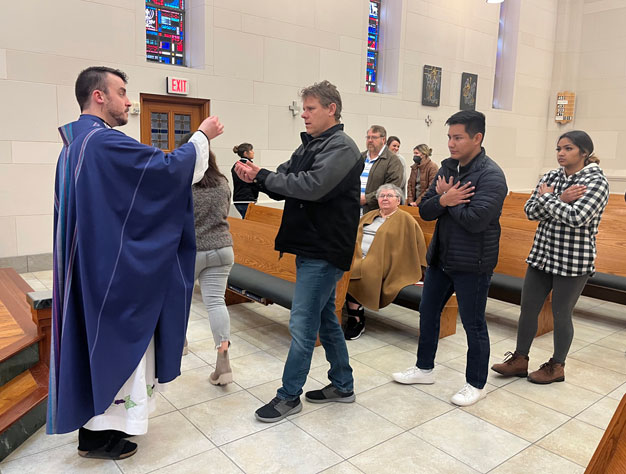
Father Ross Epping distributes Communion during Mass March 6 at Christ the King Chapel on the St. Ambrose University campus in Davenport. Students, faculty and staff offer Lenten reflections on the daily Scripture readings.
(Members of the St. Ambrose University community in Davenport are writing reflections on daily Scripture readings during Lent. Here are a few of the reflections, edited for space. To read more reflections go to https://www.facebook.com/SAUCampus Ministry)
Ella Johnson, professor of theology:
The Gospel today (March 10) includes one of my grandma’s favorite Bible verses, “knock and the door will be opened to you” (Mt. 7:7). I wish I would’ve asked my grandma why this was her favorite passage while I still had the chance; she passed away about 12 years ago. Knowing her, though, it probably had something to do with her understanding of God’s generosity.
My grandma worked side by side with my grandpa to build and maintain a plumbing and heating business in my hometown. Whenever anyone in the community came to their door knocking to ask them for financial support — for athletics, marching band uniforms, the Girl Scouts, the high school musical, the food pantry and especially the local parish — they gave generously.
In the first reading, we find the example of another woman of great faith inspired by God’s generosity. We read the prayer Queen Esther makes before meeting the king and begging him to stop his plot to kill all the people of her Jewish heritage living in his Persian Empire. She asks God to give her courage and strength, because the penalty for confronting the king is death.
I hope my grandma’s imitation of God’s generosity can inspire me. Esther’s example is harder to follow — at least for me. It deals with trusting in God’s generosity when working for justice. Esther knew that to protect her people, powerful systems and persons had to be confronted. This isn’t comfortable, even when we aren’t facing death! Let Esther remind us that God is on our side in the work of interrupting and confronting injustice to liberate the oppressed. This Lent, may we request and receive the courage to confront something or someone causing others harm.
Aaron Deter, senior, biology and theology:
After confiding in his 12 closest friends that he is about to die, Jesus is met with a request from James and John (March 16, Mt. 20). The two ask that their spots be reserved next to Jesus in his glory. Talk about putting the cart before the horse! As disciples, James and John have spent time following Jesus and learning from him. That’s certainly a commitment, but our faith is not about what or who we know. Jesus places the horse firmly back in front of the cart when he reminds them that what we do is what counts. We are saved by faith, but faith must always lead to action.
Jesus didn’t spend his life fixated on his coming crucifixion — neither should we spend Lent fixated on Easter alone. We can sprinkle acts of service into our Lenten resolutions quite easily: spend a Saturday morning at the food bank, write letters to local nursing home residents or even wash a few of your roommates’ dishes. Rather than focusing on reserving a spot next to Jesus in glory, we should look at those next to us now. When we live our faith, we lift the Gospel off the page, and we write it on the hearts of those around us.
Matt Jung, senior, human performance and fitness:
Jesus says in Matthew 5:44 (March 12): “Love your enemies, and pray for those who persecute you.”
It is so easy to love people who love me back, just like it’s easy to find joy in the good times and to have faith when things are going well.
Love isn’t always easy. I have loved and been loved, and I have also held anger and been hated or disliked. Not everyone is going to love me, but that doesn’t mean I’m allowed to not love them in return. I have hurt people; I have been hurt. I have fought with people. I cannot go back in time and erase past mistakes, but I can attempt to love and care for the people I have hurt, even if it is simply to pray for their healing. This Lent, may this Gospel message be a reminder to love first and not allow distress or anger get the best of us.
Paul Koch, provost and vice president:
I was struck by the following passage from Isaiah 1 (March 15), “Make justice your aim: redress the wronged, hear the orphan’s plea, defend the widow.” This passage speaks directly to me and is very much aligned with our core values as a university, where we commit to respect the human dignity of all and actively pursue justice and peace (remember that justice is always a prerequisite to genuine peace). The passage promotes the value of restorative justice, to not ignore wrongs or simply apologize, but to work toward restoring people to wholeness after a wrong.
The latter portion of this passage reminds me of the exhortation from Pope Francis on Feb. 15, 2015, when he proclaimed to a group of new cardinals, “The Gospel of the marginalized is where our credibility is found and revealed.” Matthew’s Gospel (March 15) reminds me of some in our modern-day society who, “preach but they do not practice.” These Scriptures challenge me to look in the mirror, and all of us as Ambrosians, to act and work for a world where restorative justice, in all that it implies, is the norm.
Christopher Waugh, dean of students:
I’m a sinner. Sin is something we all have in common and, as sinners, we’re deserving of judgment (Romans 6:23). Today’s (March 11) reading comes from the first part of the book of Ezekiel, a section all about judgment. It’s a burdensome read, reinforcing our fallen, sinful nature and the penalty for our wickedness.
There isn’t anything greater in the world than the cross. No event is more significant than the death and resurrection of the Son of God. The Lenten season points us to the redeeming work of Christ on the cross, where we sinners go to confess our guilt, to repent and turn away from our sins, to believe Christ’s promise of salvation and to receive Christ as our Lord and Savior. What follows saving faith in Christ is a life of freedom, a deep-felt desire to follow his teaching, have conversations with him in prayer, and share a natural outpouring of his love with those around us. If you know Jesus, I hope you’ll grow more deeply in your trust in him through the Lenten season. If you don’t know Jesus, I pray you’ll consider taking him up on his promise of hope: “…I came that they may have life and have it abundantly.”











